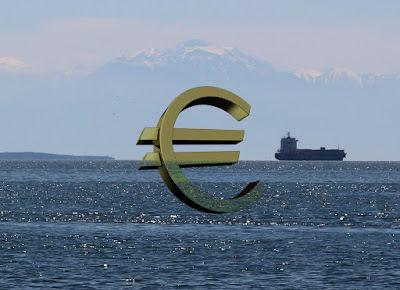How the USA may end up killing the Euro
I have just completed reading the 2007 seminal article by Barry Eichengreen about "The Breakup of the Euro Area". The author describes the barriers that a nation would face should it decide to exit the Eurozone. The barriers are of different natures: legal, technical, political and economic. However, as we will see, the financial crisis, which originated in the USA with the subprime crisis before triggering a Euro crisis, has lowered these barriers significantly to a point where a break-up of the Eurozone has become a realistic scenario.
- The technical and legal barriers are about creating a new currency, redenominating debt in the new currency and enforcing it while preventing a probable bank run because citizens that expect a devaluation will try to send their money abroad. While undoubtedly large, those barriers are not insurmountable because it has already been done (example Argentina 2001) and this barrier may be effectively lowered when people, anticipating the possibility of an exit from the Euro, already start to send their money abroad, as it is probably happening. Imagine that you are Greek and that you have some savings; where would you put your money? When you hear people talking about the possibility of your country leaving the Euro and devaluating, wouldn't you place as much money as possible outside the Greek banks?
- The economic barrier is that a country leaving the Euro may not be able to borrow from international markets after it denominates its debt into a new currency and partially defaults on it. There are several arguments against this barrier. First, even though southern European nations are protected by the Euro, their cost of debt has already reached unsustainable levels, are effectively (Greece) or nearly (Spain, Italy) shut down from international debt markets and are supported only by the IMF, EU and ECB. Second, as Eichengreen explains it, the fact that Europe has suffered from an external shock (US subprime then credit crisis which started the Euro crisis) means that weaker countries can credibly reinforce the independence of its central bank and the efficiency of its fiscal institutions to prevent an increase in their borrowing cost.
"A country contemplating exit in order to obtain the kind of real depreciation needed to address problems of chronic slow growth and high unemployment would be deterred if it thought that its efforts to engineer a real depreciation would be frustrated by the inflationary response of domestic wages and prices, or if it thought that leaving the monetary union would significantly raise its debt servicing costs. But if the defector strengthens the independence of its central bank and the efficiency of its fiscal institutions, then it is at least conceivable that these negative economic effects would not obtain."
- The political barrier is that a country leaving the Euro unilaterally may be seen by its neighbour as less committed to the European integration project and may be downgraded to a second level partner status and may see its international influence weakened. According to Eichengreen, this is the greatest barrier to exit. However the fact that Europe has suffered an EXTERNAL shock makes this argument weaker. The exiting country - suffering a depression spiral (cf. economic suicide by Krugman) - can argue that he has been forced out and may then come back later from a stronger position.


Comments
Post a Comment